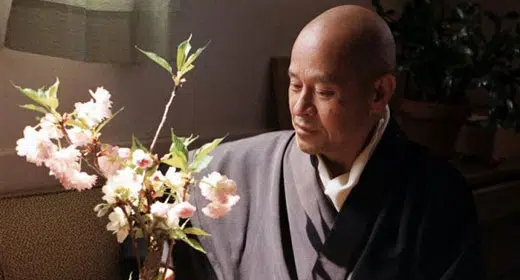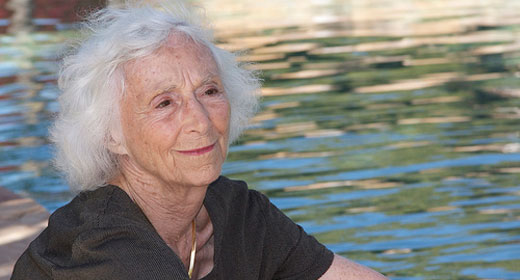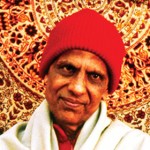by Paramahansa Yogananda: A talk given on May 21, 1944, at Self-Realization Fellowship Temple, Hollywood, California. This and many other discourses by Paramahansaji appear in the three volumes of his Collected Talks and Essays, published by SRF…

The Purpose of Yoga
Yoga is a system of scientific methods for reuniting the soul with the Spirit. We have come down from God, and we must reascend to Him. We have seemingly become separated from our Father, and we must consciously reunite with Him. Yoga teaches us how to rise above the delusion of separation and realize our oneness with God. The poet Milton wrote of the soul of man and how it might regain paradise. That is the purpose and goal of Yoga—to regain the lost paradise of soul consciousness by which man knows that he is, and ever has been, one with Spirit.
Yoga Is the Science of True Religion
The world’s various religions are based more or less on the beliefs of man. But the true basis of religion should be a science that all devotees may apply in order to reach our one Father-God. Yoga is that science. The practice of a science of religion is imperative. Different dogmatic “isms” have kept mankind divided, although Jesus pointed out: “If a house be divided against itself, that house cannot stand” (Mark 3:25). Unity among various religions may be brought about only when the individuals who practice those religions become actually aware of God within. Then we shall have a true brotherhood of man under the Fatherhood of God.
The great religions of the world all preach the necessity of finding God, of brotherhood among men; and all have a moral code, such as the Ten Commandments. What, then, creates the differences among them? It is the bigotry in men’s minds. Not by concentrating on dogma may we reach God, but by actual soul knowledge. When men perceive the universal truths underlying various religions, there will be no more difficulties over dogma. To me there is neither Jew, nor Christian, nor Hindu; all are my brothers. I worship in all temples, for each of them has been erected to honor my Father.
We should begin to build world unity with the idea that has been initiated by Self-Realization Fellowship: a “Church of All Religions”; not eclecticism, but respect for all religions as constituting various paths to God. Such temples, dedicated to the one God that all religions worship, should be built everywhere. I predict that this will come about. East and West should destroy forever narrow divisions in the houses of God. Attaining Self-realization through Yoga, men will come to know that they are all children of the one Father.
The Blind Cannot Lead the Blind
That unity of spirit is demonstrated in great men, those with God-realization. The blind cannot lead the blind; only a master, one who knows God, may rightly teach others about Him. To regain one’s divinity one must have such a master or guru. He who faithfully follows a true guru becomes like him, for the guru helps to elevate the disciple to his own level of realization. When I found my guru, Swami Sri Yukteswarji, I made up my mind to follow his example: to place God alone on the altar of my heart, and to share Him with others.
The Hindu masters taught that to gain the deepest knowledge one should focus his gaze through the omniscient spiritual eye. When concentrating hard, even the non-yogi wrinkles his forehead at the point between the eyebrows—the center of concentration and of the spherical spiritual eye, the seat of soul intuition. That is the real “crystal ball” into which the yogi gazes to learn the secrets of the universe. Those who go deep enough in their concentration will penetrate that “third” eye and see God. Seekers of truth therefore should develop the ability to project their perception through the spiritual eye. The practice of Yoga helps the aspirant to open the single eye of intuitive consciousness.
Intuition or direct knowledge does not depend on any data from the senses. That is why the intuitive faculty is often called the “sixth sense.” Everyone has this sixth sense, but most people do not develop it. However, almost everyone has had some intuitional experience, perhaps a “feeling” that a particular thing is going to happen, when there is no sensory evidence to indicate it.
It is important to develop intuition, or direct soul knowledge, for he who is God-conscious is sure of himself. He knows, and he knows that he knows. We must be sure of God’s presence, as sure as we are that we know the taste of an orange. It was only after my Guru had shown me how to commune with God and after I had felt His presence every day that I assumed the spiritual duty of telling others about Him.
The West has emphasized large temples of worship, but there are few in which the worshipers are shown how God may be found. In the East, the emphasis has been on the development of men of God-realization; but they are in many cases inaccessible to spiritual seekers, remaining in seclusion in remote and solitary abodes. Spiritual centers in which people may commune with God, and teachers who can show people how to do so, are both necessary. How may one receive knowledge of God from a teacher who himself does not know God? My Guru impressed upon me the necessity of knowing the Heavenly Father before trying to tell others about Him. How grateful I am to have received his training! He himself truly communed with God.
The Lord must first be perceived in one’s own bodily temple. Every seeker should daily discipline his thoughts and place on the altar of his soul the wildflowers of his devotion. He who finds God within will be able to feel His presence in every church or temple he enters.
Yoga Converts Theology to Practical Experience
Yoga enables man to perceive the truth in all religions. The Ten Commandments are preached, in various words, in every religion. But the two greatest commandments are those emphasized by Jesus: “Love the Lord thy God with all thy heart, and with all thy soul, and with all thy mind,” and “Thou shalt love thy neighbor as thyself” (Matthew 22:37, 39).
Loving God “with all thy mind” means withdrawing one’s attention from the senses and giving it to God; giving to Him one’s whole concentration in meditation. Every seeker of God must learn to concentrate. A prayer that one utters while at the same time thinking of other things in the background of the mind is not a true prayer and is unheeded by God. Yoga teaches that in order to find the Father it is first necessary to seek Him with all one’s mind, with concentration that is one-pointed.
Some people say that the Hindus are more adapted to the practice of Yoga, that Yoga is not suited to Westerners. This is not true. Many Westerners are at present in a better position to practice Yoga than many Hindus are, because scientific advancements have given Westerners much free time. India should more and more utilize the progressive material methods of the West to make life easier and freer; and the West should take from India the practical metaphysical methods of Yoga whereby every man may find his way to God. Yoga is not a sect but a universally applicable science by which we can find our Father.
Yoga is for everybody, for the people of the West as well as for those of the East. One would not say that the telephone is not for the East just because it was invented in the West. Similarly, the methods of Yoga, although developed in the East, are not exclusively for the East but are useful to all mankind.
Whether a man is born in India or in America, he someday has to die. Why not learn how to “die daily” in God, like St. Paul? (I Corinthians 15:31) Yoga teaches the method. Man lives in the body as a prisoner; when his term is over, he suffers the indignity of being thrown out. Love of the body is therefore nothing more than love of jail. Long accustomed to living in the body, we have forgotten what real freedom means. Being a Westerner is no excuse for not seeking freedom. It is vital to every man that he discover his soul and know his immortal nature. Yoga shows the way.
Before creation existed there was Cosmic Consciousness: Spirit or God, the Absolute, ever-existing, ever-conscious, ever-new Bliss beyond form and manifestation. When creation came into being, Cosmic Consciousness “descended” into the physical universe where it manifests as Christ Consciousness: the omnipresent pure reflection of God’s intelligence and consciousness inherent and hidden within all creation. When the Christ Consciousness descends into the physical body of man it becomes soul, or superconsciousness: the ever-existing, ever-conscious, ever-new bliss of God individualized by encasement in the body. When the soul becomes identified with the body, it manifests as ego, mortal consciousness. Yoga teaches that the soul must climb back up the ladder of consciousness to Spirit.

Note: Yoga teaches that the abode of the soul—of man’s life and divine consciousness—is in the subtle spiritual centers in the brain: Sahasrara, the thousand-petaled lotus at the top of the cerebrum, seat of cosmic consciousness; Kutastha, at the point between the eyebrows, seat of Christ consciousness; and the medullary center (connected by polarity to the Kutastha), seat of superconsciousness. Descending into the body (and body-consciousness) from these centers of highest spiritual perception, life and consciousness flow down the spine, passing through five astral spinal centers and branching outward into the physical organs of life, sensory perception, and action.
To regain the blissful realization of its oneness with God, the soul of man must retrace its downward course, ascending by the sacred spinal route to its home in the higher cerebral centers of divine awareness. This is accomplished by the practice of guru-given scientific techniques of yogic meditation, such as may be learned from the Self-Realization Fellowship Lessons.

Secret of Happiness Is Consciousness of God’s Presence
It is all right to enjoy life; the secret of happiness is not to become attached to anything. Enjoy the smell of the flower, but see God in it. I have kept the consciousness of the senses only that in using them I may always perceive and think of God. “Mine eyes were made to behold Thy beauty everywhere. My ears were made to hear Thine omnipresent voice.” That is yoga, union with God. It is not necessary to go to the forest to find Him. Worldly habits will hold us fast wherever we may be until we free ourselves from them. The yogi learns to find God in the cave of his heart. Wherever he goes, he carries with him the blissful consciousness of God’s presence.
Man has not only descended into mortal sense consciousness but has become bound by abnormalities of that sense consciousness, such as greed, anger, and jealousy. Man must banish these abnormalities in order to find God. Both Easterners and Westerners should be free from sense slavery. An ordinary man may become angry because his morning coffee hasn’t been brought to him and he is sure the deprivation will give him a headache. He is a slave of his habits. The developed yogi is free. Everyone can be a yogi, right where he is now. But we are prone to think strange and difficult anything that is beyond the horizon of our own habits of life. We do not consider how our habits may appear to others!
The practice of Yoga leads to freedom. Some yogis carry this idea of non-attachment to extremes. They teach that one should be able to lie on a bed of nails without discomfort, and other forms of tapasya, physical discipline. It is true that one who can sit on a bed of nails and think of God shows great strength of mind. But such feats are not necessary. One may just as well sit in a comfortable chair and meditate on God.
Patanjali teaches that any posture that keeps the spine erect is good for meditation, yogic concentration on God. It is not necessary to go through physical contortions or to practice exercises requiring extraordinary physical endurance and suppleness, as is advocated in Hatha Yoga. God is the objective; consciousness of His presence is what we should work toward. The Bhagavad Gita says: “He who absorbs himself in Me, with his soul immersed in Me, him I regard, among all classes (of yogis), as the most equilibrated” (VI:47).
Hindu yogis have been known to demonstrate obliviousness to extremes of heat and cold, and to mosquitoes and other annoying insects. Such a demonstration is not a requisite of being a yogi, but it is natural achievement of the adept. Try to eliminate disturbing elements; or to endure them, if necessary, without being disturbed inwardly by them. If one can remain clean it is pointless to be dirty. One may become attached to living in a hut as well as to living in a palace.
The greatest factor in achieving spiritual success is willingness. Jesus said, “The harvest truly is plenteous, but the laborers are few” (Matthew 9:37). People of the world seek the gifts of God, but he who is wise seeks the Giver Himself.
To be a yogi is to meditate. The yogi doesn’t think first of food for his body upon waking each morning; he feeds his soul with the ambrosia of God-communion. Filled with the inspiration found by his deeply diving meditative mind, he is able to perform happily all the duties of the day.
God made this earth as it is on purpose; in His plan it is man’s part to make the world better. The Westerner tends to go to extremes in keeping constantly busy getting new and improved material comforts. The Easterner tends to go to extremes in being satisfied with what he has. There is something appealing about both the go-ahead spirit of the West and the easy, calm spirit of the East. We should take the balanced road between.
Meditation Makes the Yogi
To find God, one should meditate every morning and night, and whenever there is a little spare time during the day. In addition, it is important to meditate for six hours on one day out of the week. This is not unreasonable; some people practice at the piano for ten hours every day of the week, and think nothing of it. To become a spiritual master, it is necessary to give more time to God. We have to make Him feel that we love Him more than anything else. When you become experienced in meditation, able to go deep into superconsciousness, five hours of sleep are enough. The rest of the night should be used for meditation. One can use nights and early mornings and holidays for meditating on God. In this way anyone, even the busy Westerner, can be a yogi. So become a Western yogi. You don’t have to wear a turban or to have long hair like me!
We need the “hives” of churches, but we also need to fill the churches with the “honey” of our own Self-realization. God is present in the churches too, of course; but your just going there will not persuade Him to reveal Himself. Churchgoing is good, but daily meditation is better still. Do both, because you will certainly have inspiration from going to church; and from daily meditation you will receive even greater upliftment. It is when a devotee’s heart is afire and when he throws shell after shell of prayer that God surrenders to him. That unceasing devotion is essential to finding Him. In order to be a yogi and still keep pace with the modern world, it is necessary to meditate at home, to discipline oneself, and to perform all duties with the attitude that they are a service to God.
My greatest desire is to build temples of God in the souls of men; to see the smile of God on men’s faces. The most important of all life’s accomplishments is to establish a temple of God in one’s own soul. And it can be easily done. That is why Self-Realization Fellowship was sent to the West.
Anyone who has established God in his soul temple is a yogi. He can say, with me, that Yoga is for the East, North, South, and West—for all people, that they may follow the byways of theology to join the highway of Yoga. The right road leads to the palace of God’s bliss. He who once reaches there shall “go no more out” (Revelation 3:12).









































